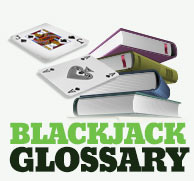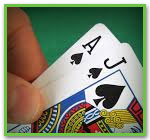
Blackjack Glossary
Blackjack is one of the great games of skill in the casino. It combines fast action with great odds for the players and plenty of opportunities to use your knowledge to improve your chances of winning. However, if you're new to internet gambling, it's likely that you won't know many of the terms and phrases commonly uttered around the blackjack table.
Here's a look at some of the most important terms you'll need to know if you want to play blackjack!
Blackjack - Not only the name of the game, but also the best possible hand a player or dealer can start with. This 21-point hand is comprised of an ace and another ten-point card.
Bust - Going over 21. Any hand that exceeds 21 points is said to have "gone bust."
 Basic Strategy - The set of actions that will offer the best possible return over the long run for the player given the player's hand and the dealer's up card. A basic strategy is usually displayed as a chart, and covers all possible player hand/dealer card combinations.
Basic Strategy - The set of actions that will offer the best possible return over the long run for the player given the player's hand and the dealer's up card. A basic strategy is usually displayed as a chart, and covers all possible player hand/dealer card combinations.
Card Counting - The act of keeping track of which cards have been played in order to know the odds of which cards will be dealt from the remaining shoe. This advantage play allows players to know whether the remaining shoe is rich in cards that are good for the player or the dealer, and adjust their bets accordingly. Because online gambling sites will "reshuffle" the shoe after every hand, card counting is not possible in online blackjack.
Double Down - A bet offered at the beginning of a hand, in which a player doubles his original bet after seeing his/her hand, and draws only one additional card. Players are then forced to stand, with the total bet winning or losing based on the result of the hand.
Even Money - This is a version of the insurance bet offered only when a player is holding blackjack and the dealer shows an ace. The player can request even money, and be immediately paid the value of the original bet instead of the normal 3-2 odds on the blackjack.
Blackjack Pages on
First Base - The player sitting directly to the left of the dealer who receives cards first, as well as being the first to act on each hand.
Hard Hand - A hand that does not contain an ace and which still counts as an 11-point card.
Hit - One of the two basic actions in blackjack, in which the player requests an additional card for their hand.
Hole Card - The second dealer card which remains face down until all players have finished acting on their hands.

Push - A tie between the player and dealer. In the case of a push, any bets on the hand that pushed with the dealer are returned to the player.
Shoe - A device containing multiple decks of cards from which a dealer deals during play. The size of a shoe is expressed in the number of decks it holds, such as a six-deck shoe or an eight-deck shoe.
Soft Hand - Any hand containing an ace valued as 11 points. Soft hands cannot bust, as the ace can still revert to counting for only one point if the hand would otherwise go over 21.

Stand - One of the two basic actions in blackjack, in which a player ends his actions without taking any further cards.
Surrender - An option for the player to give up on their hand, forfeiting half of their bet. This option is typically only offered at the beginning of a hand; depending on the specific rules in place, this can occur before or after the dealer checks for blackjack.
Third Base - The player in the position to the right of the dealer who is the last to act before the dealer reveals his hole card. Many superstitious players will blame losses on poor play by the player in third base, though their play does not actually change anyone else's odds of winning.
Up Card - The card that the dealer is showing face up to the players.
